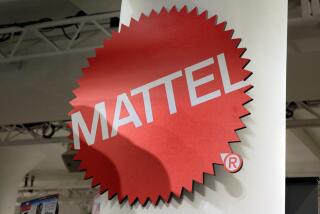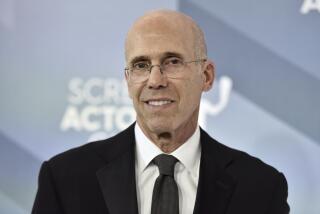Wall Street cheers possible Hasbro-DreamWorks Animation deal
- Share via
DreamWorks Animation shares surged 14% as Wall Street was quick to embrace a potential sale of the studio to toy giant Hasbro.
A deal would combine one of the industry’s leading animation studios, known for its “Shrek,” “Kung Fu Panda” and “Madagascar” movies, with a toy maker that has been eager to expand its own presence in Hollywood and create a broader market for toys that include G.I. Joe, Transformers and My Little Pony.
Details of the talks emerged late Wednesday, sending the stock to $25.52 at the closing bell in New York a day later.
“We do see some opportunities for the two to effectively work together through both consumer product line development and the use of some of Hasbro’s brands/franchises in future movies,” analyst Eric Wold of B. Riley & Co. wrote in a research note.
Representatives of DreamWorks and Hasbro declined to comment on what they called “rumor and speculation.”
The talks come as DreamWorks Animation Chief Executive Jeffrey Katzenberg has been actively shopping the studio he co-founded 20 years ago.
Katzenberg had been in talks in September to sell the studio to Japanese telecommunications giant SoftBank, but those discussions fizzled. Katzenberg also made an unsuccessful effort to interest Rupert Murdoch’s 21st Century Fox in buying DreamWorks.
The talks with Hasbro, however, are serious and could conclude in the next 60 days, two people familiar with the negotiations said. Under one scenario being discussed, Katzenberg would be in charge of the combined operation.
Hasbro executives see synergies in joining with DreamWorks but have yet to agree on a sale price, according to the people, who were not authorized to discuss the confidential negotiations.
Katzenberg is said to be seeking more than $30 a share for DreamWorks, which is considered a high premium for the studio.
Buying DreamWorks Animation would allow Hasbro to expand its push into Hollywood, taking advantage of the studio’s creative talents and film library. Hasbro, the second-largest toy company, behind Mattel, has a growing entertainment business, including a studio in Burbank to develop and produce TV shows based on its toys.
The results have been mixed. Whereas the 2012 “Battleship” movie was a dud, the “Transformers” movies have grossed about $3.75 billion in ticket sales worldwide. And the Universal Pictures movie “Ouija,” which is based on the Hasbro board game, has been a hit.
Hasbro also has a long history of television animation dating back to the 1980s. Four years ago, it launched a joint venture with Discovery Communications to operate a children’s channel known as the Hub Network. In September Hasbro sold part of its stake in the channel to Discovery, which has taken over management of the channel.
For its part, DreamWorks could gain the financial stability it needs by joining with Hasbro, lessening its reliance on animated movies that have had a spotty record at the box office in recent years.
The studio has taken three write-downs in two years on its films, causing a sharp decline in its share price.
Analysts said a tie-up with Hasbro would allow DreamWorks to significantly expand its consumer products business, which is relatively small compared with rivals such as Walt Disney Studios. It would also fit Katzenberg’s strategy of diversifying operations.
DreamWorks also owns Awesomeness TV and has been in talks with Hearst Publishing to form a joint venture with the YouTube teen network, people familiar with the matter say.
Investors in Hasbro, however, reacted coolly to the news, fearing that buying DreamWorks would expose the company to the risks of the movie business. Hasbro’s stock closed a $54.98, down 4%, on Thursday.
Analysts also weren’t convinced.
“There is no industrial logic whatsoever to this hypothetical combination,” Vasily Karasyov, an analyst with Sterne Agee, wrote in a research note. “We don’t see a plausible argument for why Hasbro would pay 41% of its current market capitalization for a company which ... is facing serious challenges.”
Follow me on Twitter: @rverrier
More to Read
Sign up for The Envelope
Get exclusive awards season news, in-depth interviews and columnist Glenn Whipp’s must-read analysis straight to your inbox.
You may occasionally receive promotional content from the Los Angeles Times.








